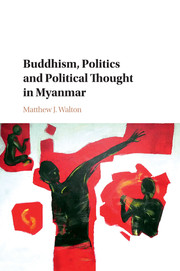Book contents
- Frontmatter
- Dedication
- Contents
- Acknowledgments
- A Note on Language and Usage
- Introduction
- 1 A Brief Political History and Cast of Characters
- 2 Building Blocks of a Moral Universe
- 3 On Human Nature and the Nature of Politics
- 4 Order and Freedom/Liberation: Purposes of Politics
- 5 What is “Politics” and What Constitutes “Participation”?
- 6 Discipline, Rights, and Morality: “Democracy” in Contemporary Myanmar
- Conclusion
- Appendix Glossary of Burmese and Buddhist Terms
- Bibliography
- Index
2 - Building Blocks of a Moral Universe
Published online by Cambridge University Press: 22 December 2016
- Frontmatter
- Dedication
- Contents
- Acknowledgments
- A Note on Language and Usage
- Introduction
- 1 A Brief Political History and Cast of Characters
- 2 Building Blocks of a Moral Universe
- 3 On Human Nature and the Nature of Politics
- 4 Order and Freedom/Liberation: Purposes of Politics
- 5 What is “Politics” and What Constitutes “Participation”?
- 6 Discipline, Rights, and Morality: “Democracy” in Contemporary Myanmar
- Conclusion
- Appendix Glossary of Burmese and Buddhist Terms
- Bibliography
- Index
Summary
“Democracy means acting in accordance with taya.”
(Ashin Eindaga, public sermon, Yangon, January 31, 2011)The Burmese word taya has multiple layers of meaning that can refer to justice, law, truth, the Buddha's teachings or a combination thereof. Not only this, there are also multiple conceptions of “truth” that operate within Theravāda doctrine, as well as different levels on which people can grasp the Buddha's teachings, dependent on their moral and spiritual progress. The above quote from a Burmese monk's sermon illustrates the impossibility of parsing Burmese Buddhist views on, for example, democracy, without reference to the Buddhist concepts that they use to describe political beliefs and practices or to the overarching Theravāda moral framework within which those concepts are understood.
This chapter lays out the basic components of the modernist Buddhist worldview which anchors the Burmese political thinking analyzed in this book. I consider this “moral universe” to be a relatively consistent set of beliefs and concepts within which many Buddhists in Myanmar cognitively organize and engage with their social and political worlds. This framework draws from Burmese sources and I occasionally note areas where Burmese interpretations of these basic components may differ from the more general conceptions that scholars designate as “ Theravāda.” I also point toward some of the ways in which Burmese thinkers have understood these principles to be relevant in navigating the social and political spheres, which are developed in later chapters. While Burmese Buddhists usually work with ideas that are part of the common conceptual framework of Theravāda Buddhism, the unique aspects of their perspectives on politics can come from several factors, including a stronger emphasis on a particular concept, a distinct interpretation of a common idea, a discussion or debate specific to Burmese society, or a response to a particular political and economic event or context.
As noted in the Introduction, this particular iteration of a Theravāda moral universe is not itself universal, although I would argue that it has provided the framework for the dominant tradition of Buddhist political thought in Myanmar over the last 150 years and specifically for those writers, thinkers, and preachers whose ideas are examined here.
- Type
- Chapter
- Information
- Buddhism, Politics and Political Thought in Myanmar , pp. 36 - 64Publisher: Cambridge University PressPrint publication year: 2016

